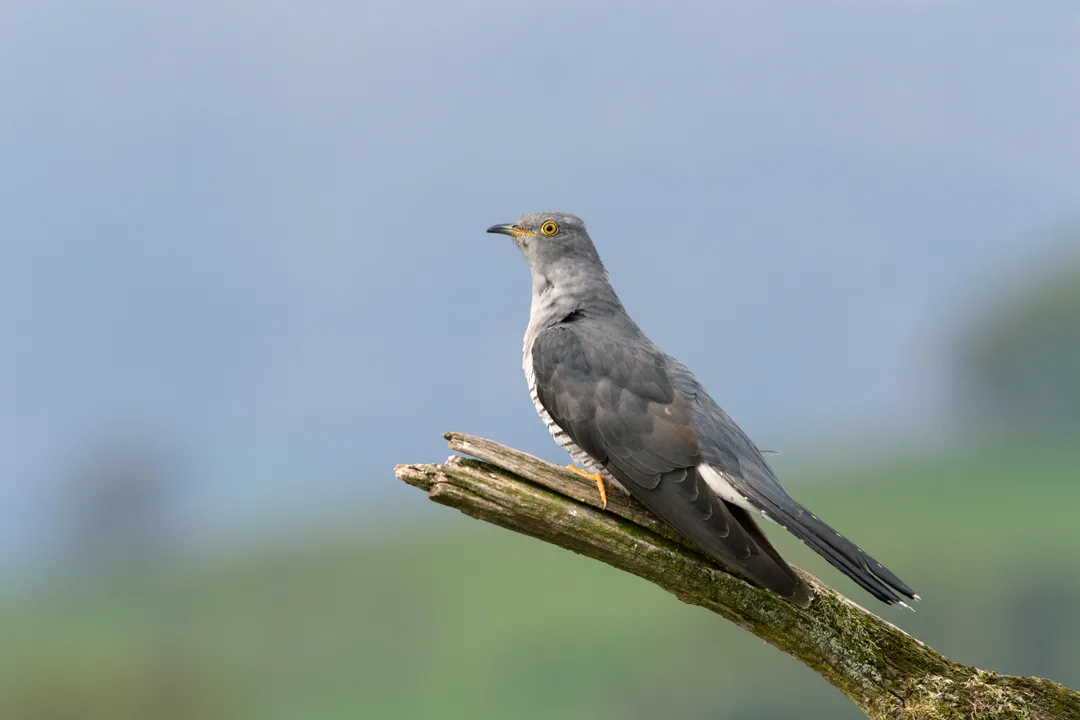Citation

Overview
The average spring arrival dates of many summer migrants have advanced over recent decades, but the Cuckoo is one of several species in which this has not happened. The long-term decline in UK Cuckoo populations, together with the link between a changing climate and changing spring arrival dates more generally, raises the question as to why there has been such a limited shift in Cuckoo arrival times. This study sets out to address this question.
In more detail
The authors use 11 years of satellite tracking data from 87 male Cuckoos, tagged at 11 sites across the UK, to examine variation in migratory timing throughout the annual cycle and its potential consequences. A number of key questions were addressed through this work.
- How much variation and repeatability is there in migratory timing across the annual cycle, and how likely is it that the Cuckoo’s ability to respond to environmental change is being constrained?
- How is spring arrival at the breeding grounds impacted by the timing of previous migration stages (such as departure from the wintering grounds and spring stopover sites)?
- Does the timing of migration impact mortality, and does this vary by breeding habitat and/or the post-breeding migration route used?
The analyses revealed that the degree of variation in migratory timing differed significantly across the annual cycle. It was largest for movements from the central African wintering grounds, then decreased sharply to its minimum at departure from the West African stopover. It then remained low through to arrival at the breeding grounds, before increasing again during southbound migration through Europe and across the Sahara.
The major determinant of the timing of spring arrival in the UK was departure from West Africa. Individuals that left West Africa earliest arrived back on the breeding grounds earliest. The high level of synchrony observed in Cuckoos at departure from West Africa suggests a relatively narrow optimal window of departure from this stopover, and limited flexibility to adjust the timing of this event. The results strongly suggest that the arrival of UK Cuckoos at their breeding grounds is limited by the environmental conditions constraining the timing of their departure from the spring stopover site in West Africa.
Conditions within Africa improve from south to north in the northern hemisphere spring, with the arrival of rains associated with the Intertropical Convergence Zone. The rains deliver a flush of vegetation and a burst of invertebrate activity, the latter providing food for many migrating birds. The timing of increases in resource availability across the dry-to-wet season transition, which limit fattening rates in migrating birds, likely delay Cuckoos reaching the appropriate body condition to initiate a northward crossing of the Sahara.
By looking at how mortality risk varied with timing across the annual cycle, the team was able to gain some important insight into how these limitations impact individuals and, therefore, potentially populations. In periods following the migration stages that were most important in determining breeding grounds spring arrival timing, early birds were more likely to die than later ones. This suggests that in order to try to gain the benefits of arriving early at the breeding grounds, birds suffer increased mortality risk; in other words, they are trading off exposing themselves to survival risks against the benefits of early arrival. Such risks may become more necessary as birds try to keep up with climate change on the breeding grounds.
The fact that the authors found that migration timing didn’t reset during the midwinter period, and that part of post-breeding migration is included in the periods when birds appear to be exposing themselves to these risks, suggests that in the case of UK Cuckoos, all ecological levers are being pulled in an attempt to advance spring arrival. The resulting increase in mortality rates may form part of the demographic mechanisms linking failure to advance spring arrival to the population declines that we have seen.
This work adds to our understanding of why UK Cuckoos have only shown a limited advance to the timing of their spring arrival. This new knowledge allows for better prediction of future responses to a changing climate, and reveals how conservation measures might mitigate the consequences of timing stresses at different points of the Cuckoo’s annual cycle.
Abstract
Failure to adapt migration timing to changes in environmental conditions along migration routes and at breeding locations can result in mismatches across trophic levels, as occurs between the brood parasitic common cuckoo Cuculus canorus and its hosts. Using satellite tracking data from 87 male cuckoos across 11 years, we evaluate why the cuckoo has not advanced its arrival to the UK. Across years, breeding ground arrival was primarily determined by timing of departure from stopover in West Africa before northward crossing of the Sahara. Together with high population synchrony and low apparent endogenous control of this event, this suggests that a seasonal ecological constraint operating here limits overall variation in breeding grounds arrival, although this event was itself influenced by carry-over from timing of arrival into tropical Africa. Between-year variation within individuals was, in contrast, mostly determined by northward migration through Europe, probably due to weather conditions. We find evidence of increased mortality risk for (a) early birds following migration periods positively impacting breeding grounds arrival, and (b) late birds, possibly suffering energy limitation, after departure from the breeding grounds. These results help identify areas where demands of responding to global change can potentially be alleviated by improving stopover quality.
This study and the BTO Cuckoo Tracking Project were funded by the A. G. Leventis Foundation, BBC Wildlife Fund, Dulverton Trust, BTO including from much appreciated gifts in Wills, Ernest Kleinwort Charitable Trust, Essex and Suffolk Water, Mark Constan-tine, Tobit Trust and ‘Cuckoo Sponsors and Champions’ (including Anglian Water, the Broads Authority, Dartmoor National Park, Devon Birds, Gillian & Justin Wills, Severn Trent Water, and Sussex Ornithological Society).




